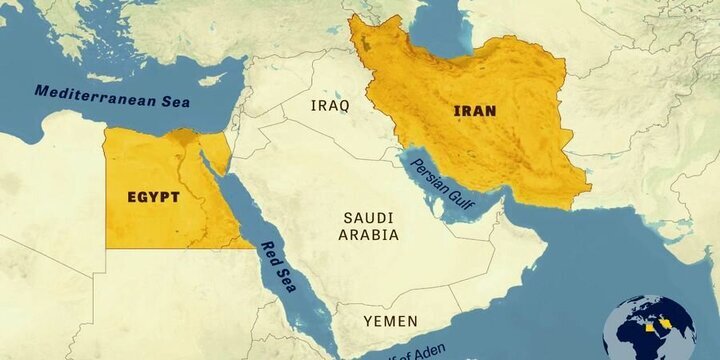Cairo – Iran’s Foreign Minister Abbas Araguchi’s visit to Cairo represents a very important diplomatic moment in the context of a disturbed region. It reflects gradual changes in Egypt-Iran relations that have been frozen for decades due to geopolitical considerations and diverse regional alliances.
The reception of Araguchi by Egyptian President Abdel Fatta El-Sisi sends a double message. One highlights Iran the potential for a broader formal communication channel, while the other emphasizes that Cairo is acting in line with its national interests and strategic balance. This reinforces Egypt’s position as a flexible actor in shaping the dynamics of West Asia.
The political dimension of the visit goes beyond the reopening of bilateral relations, extending to delicate issues, particularly Egypt’s attempts to regain its role as an active diplomatic mediator in Iran’s nuclear file. Hosts of the trilateral conference, involving Araguchi of Cairo, IAEA Director Rafael Grossi and Egypt’s Foreign Minister Badr Abdelatti, will bring strategic implications for Egypt’s relocation, which is at the heart of the nuclear non-proliferation equation. This is consistent with the historic stance of granting new leverage in Egyptian regional security arrangements and advocating for a Western Asia without weapons of mass destruction.
The core aspect of the visit serves as a true test of Egypt’s ability to act as a “constructive neutral zone.” Though not a party to the Muscat negotiations, Egypt owns diplomatic capital that can invest in promoting understanding. This role is consistent with Cairo’s principled and immobilized commitment to limiting nuclear proliferation as the basis for its vision for collective security in West Asia. It also helps Egypt develop a balanced and internationally accepted position among various regional and global actors.
Furthermore, separate meetings between Araguchi and Egyptian political and economic elites have both symbolic and strategic significance, reflecting Iran’s desire to develop a “second track” of relationships. It bypasses the government and instead relies on elite understanding, sinks and investment companies. This approach establishes a common foundation for sharing priorities and can overcome stereotypes that have long hindered bilateral relations.
These conferences also present an opportunity for Egypt to present a vision for regional cooperation from an integrated perspective covering the economy, security and culture. To achieve this, Cairo is expected to propose non-conflict approaches to troubling issues like Yemen and Syria, emphasizing that economic cooperation cannot be separated from security or political realities. In this sense, Egypt practices a form of “preventive diplomacy” that aims to reduce local tensions rather than simply managing them.
The timing of the visit is inseparable from the broader regional context, particularly the relative withdrawal of the US from Western Asia issues and the growing competition between Turkey, Iran and Israel in contested regions such as the Caucasus and the eastern Mediterranean. Among these dynamics, Cairo sees an opportunity to present a third model of regional relations based on dialogue rather than dialogue, while maintaining an international alliance with the Persian Gulf.
Economically, Egypt is able to provide Iran with promising opportunities for cooperation, particularly in the energy, maritime transport, agricultural investment and petrochemical industries, and can take advantage of its geographical position as a gateway to the African market. In return, Tehran proposed a priority agreement for Cairo in the unlicensed sector, opening the door for “calculated” cooperation that considers international reservations without missing developmental opportunities.
At the IAEA level, the Director’s participation in trilateral consultations adds technical aspects to enhance the reliability of the visit. Through this conference, Cairo was able to propose regional projects to support the framework of Egypt’s long-standing vision for the Middle East that does not include WMD, not just in Iran, but also in Israel and elsewhere. Although ambitious, this proposal gives Egypt a moral and diplomatic status that cannot be ignored.
Given the challenges surrounding Iran’s nuclear program and the growing need for mutual regional assurance, Egypt has been able to work with the IAEA to establish itself as a trusted partner of a potential regional consortium for nuclear fuel enrichment or monitoring peaceful nuclear use. Cairo’s technical nuclear expertise and long-standing membership in the Non-Proliferation Treaty (NPT) gives the credibility to play the role of supervision or coordination at specific stages of peaceful nuclear energy use in the region, by hosting training programs and regional technology centres to enhance transparency and build trust through joint verification mechanisms. Egypt’s involvement in this new framework could help reduce mutual doubt and provide an Arab alternative that will reassure the regional capital for Iran’s nuclear purpose without resorting to escalation or military choice.
These dynamics reflect Iran’s enthusiasm to increase engagement through indirect channels while trying to overcome diplomatic blockades through Arab actors with regional and international legitimacy, such as Egypt. Therefore, Tehran will use this visit to test the limits of the settlement and explore the possibility of restructuring its relationship with key Arab players at the potential nuclear trading stage or even in the absence of such transactions.
In conclusion, Abbas Aragut’s visit to Cairo appears as a diplomatic turning point in Egypt’s “practical openness” policy without undermining its core principles or strategic alliances. Rather than changing its axis, Egypt’s foreign policy has expanded its maneuvering space, creating a path of dialogue, building bridges among the enemies, and strengthening the status of regional and international order as a well-balanced actor who can provide practical solutions at moments of complexity.

